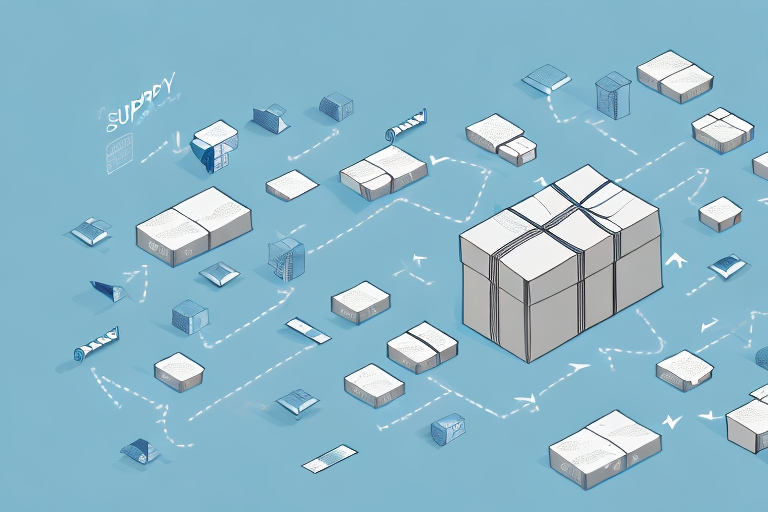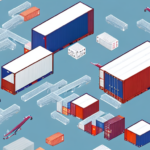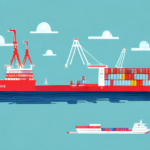Understanding CFS Fees in Global Supply Chains
As businesses increasingly rely on global supply chains for importing and exporting goods, it's crucial to comprehend the various fees associated with each step of the process. One such fee is the Container Freight Station (CFS) fee. This article delves into what CFS fees are, their impact on the supply chain, and effective strategies to minimize their influence on your bottom line.
What Are CFS Fees and Their Impact on the Supply Chain?
Container Freight Station (CFS) fees are charges levied by freight forwarders or terminal operators for the use of container freight stations. A CFS facility serves as a central point where goods are consolidated and deconsolidated for loading and unloading into containers. These fees cover the labor, storage, and operational costs involved in handling and processing containers.
CFS fees influence both importers and exporters by affecting delivery schedules and overall transportation costs. Failure to account for these fees accurately can lead to increased expenses and reduced profitability. Understanding the various components of CFS fees, such as storage, handling, and documentation fees, is essential for effective supply chain management.
According to the Bureau of Transportation Statistics, efficient management of CFS operations can reduce supply chain costs by up to 15%. Proper accounting for these fees enables businesses to make informed decisions and avoid unexpected costs.
The Role of CFS in the Global Supply Chain
CFS is a pivotal element in the global supply chain, streamlining the handling of goods by providing a centralized location for deconsolidation and consolidation. This centralization facilitates faster customs clearance as goods are organized into containers for inspection, thereby expediting the overall shipping process.
Efficient use of CFS facilities enhances supply chain visibility, reduces cargo handling and storage costs, and minimizes the risk of damage or loss during transit. Additionally, CFS facilities often offer value-added services such as labeling, packaging, and assembly, further optimizing the logistics process and improving overall efficiency.
Industry reports from sources like APICS highlight that leveraging CFS services can lead to a 10-20% improvement in supply chain efficiency by reducing unnecessary touchpoints and streamlining operations.
Types of CFS Fees: Demurrage, Detention, and Storage
CFS providers typically charge various types of fees based on the services rendered and the duration of container usage. The most common CFS fees include:
- Demurrage Fees: Charged when a container is held at a CFS beyond the allotted free time. These fees compensate for the use of the facility's space and resources during the extended period.
- Detention Fees: Applied when a container is retained at the CFS beyond the agreed-upon pickup date. This fee accounts for the delay in returning the container to the shipping line or terminal.
- Storage Fees: Incurred when a container remains at the CFS for an extended period, typically beyond the free storage period. These fees cover the cost of maintaining the container within the facility.
- Handling Fees: Charged for the physical movement of containers within the CFS facility. The complexity of handling and the type of equipment used can influence these fees.
Understanding these fee structures is vital for businesses to manage their shipping costs effectively. Negotiating favorable terms with CFS providers and optimizing container usage can significantly reduce these expenses.
Comparing CFS Fees to Other Supply Chain Costs
CFS fees, while seemingly minor in isolation, can accumulate and have a substantial impact on the total cost of shipping. When compared to other supply chain expenses such as transportation, customs duties, warehousing, and insurance, CFS fees can represent a significant proportion of the overall budget.
Transportation Costs
Transportation costs vary based on the mode of transport, distance, and the weight and volume of goods. For instance, maritime shipping typically incurs lower costs per unit compared to air freight but has longer transit times.
Customs Fees
International shipments are subject to customs duties, taxes, and other charges imposed by government authorities. Compliance with customs regulations is essential to avoid delays and additional costs.
Warehousing and Insurance
Warehousing costs cover the storage of goods before and after transit, while insurance fees protect against potential losses during shipping. Both of these costs are integral to the supply chain and must be managed alongside CFS fees.
Integrating these costs into the overall supply chain strategy ensures a comprehensive approach to cost management, enhancing profitability and operational efficiency.
Calculating CFS Fees for Your Shipments
Accurately calculating CFS fees requires a thorough understanding of the factors that influence these charges. Key elements to consider include:
- Container Size and Weight: Larger and heavier containers incur higher handling and storage fees.
- Duration of Storage: Extended storage periods result in increased storage and demurrage fees.
- Additional Services: Value-added services such as labeling, packaging, and assembly can elevate overall CFS costs.
- Location of CFS Facility: Facilities located in major ports or urban areas typically charge higher fees compared to those in rural or less-accessible regions.
To obtain an accurate estimate, collaborate with reputable freight forwarders or CFS providers and request detailed quotes. Transparent communication about your shipment requirements ensures that all potential fees are accounted for in your budgeting process.
For a comprehensive guide on CFS fee calculations, refer to resources from the International Civil Aviation Organization (ICAO).
Strategies to Minimize CFS Fees
Implementing effective strategies can help businesses reduce CFS fees and optimize their supply chain operations:
- Choose a Reliable CFS Provider: Partnering with a reputable and cost-effective CFS provider ensures competitive rates and quality services.
- Optimize Shipping Schedules: Efficient scheduling reduces the time containers spend at the CFS, minimizing storage and demurrage fees.
- Consolidate Shipments: Combining multiple shipments into a single container lowers the number of containers processed, reducing overall CFS fees.
- Proper Packing and Labeling: Accurate packing and labeling prevent delays and additional fees associated with reworking or relabeling containers.
- Accurate Declaration of Goods: Ensuring that the contents of containers are correctly declared helps avoid penalties and fines related to improper documentation.
Adopting these strategies not only reduces CFS fees but also enhances the efficiency and sustainability of your supply chain.
Negotiating with CFS Providers: Best Practices
Effective negotiation with CFS providers can lead to significant cost savings and better service terms:
- Understand Your Needs: Clearly define your supply chain requirements to negotiate terms that align with your business objectives.
- Seek Transparency: Ensure that all fees are clearly outlined in the contract to avoid hidden costs.
- Establish Long-Term Partnerships: Building ongoing relationships with CFS providers can lead to favorable rates and priority services.
- Leverage Competitive Bidding: Obtain quotes from multiple providers to benchmark rates and negotiate competitive pricing.
- Review Contracts Thoroughly: Carefully examine all terms and conditions, focusing on clauses related to fees, penalties, and service levels.
By applying these best practices, businesses can secure advantageous agreements that support their supply chain operations and financial goals.
Legal Considerations of CFS Fees
Understanding the legal aspects of CFS fees is essential for protecting your business interests:
- Contract Terms: Familiarize yourself with the terms and conditions outlined in your CFS contract, including fee structures, payment terms, and dispute resolution mechanisms.
- Regulatory Compliance: Ensure that your supply chain operations comply with local and international laws governing freight and logistics.
- Dispute Resolution: In cases of disputed fees, know the procedures for filing complaints and seeking reimbursement.
- Carrier Variations: Be aware that CFS fees can vary based on the carrier and the facility's location, influenced by factors like labor costs and real estate prices.
Consulting with legal experts or supply chain consultants can provide additional guidance on navigating the complexities of CFS fee agreements and ensuring compliance with relevant regulations.
Real-World Impact: Case Studies of CFS Fees
Analyzing real-world examples underscores the significance of managing CFS fees effectively:
- Case Study 1: A manufacturing company importing electronics from China initially incurred $500 per container in CFS fees. By renegotiating terms with their freight forwarder and optimizing their shipment consolidation, they reduced fees by 25%, saving over $100,000 annually.
- Case Study 2: An e-commerce retailer faced delays and additional CFS fees due to improper labeling and documentation. Implementing standardized packing procedures and accurate declarations eliminated these issues, resulting in a 15% reduction in CFS-related costs.
These case studies highlight the substantial financial benefits of proactive CFS fee management and the importance of strategic supply chain practices.
Conclusion
While Container Freight Station (CFS) fees may appear minor within the broader scope of the supply chain, they can accumulate and significantly impact profitability if not meticulously managed. By understanding the various types of CFS fees, engaging in effective negotiations with providers, and implementing strategies to minimize these costs, businesses can enhance their bottom line and optimize their global supply chain operations.
Regularly reviewing CFS fees ensures that your business avoids overcharges and unnecessary expenses. Comparing fees across different providers, analyzing invoices for discrepancies, consolidating shipments, and exploring alternative transportation modes are all practices that contribute to cost efficiency.
Moreover, integrating sustainable practices within your supply chain not only reduces CFS fees but also promotes environmental responsibility. Adopting eco-friendly transportation options, minimizing packaging materials, and optimizing logistics processes contribute to both cost savings and a sustainable future.
By prioritizing effective CFS fee management and sustainable supply chain strategies, businesses can achieve greater financial performance and operational excellence in the competitive global market.






















